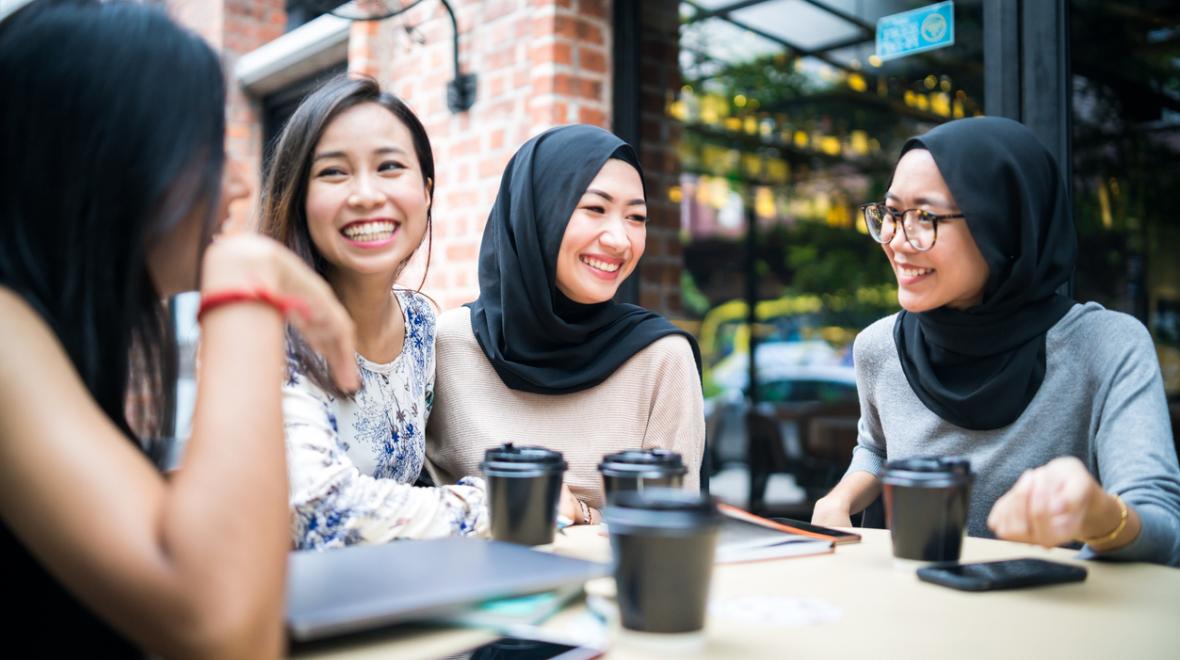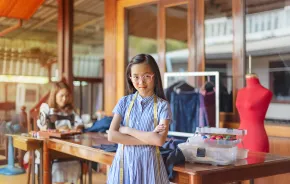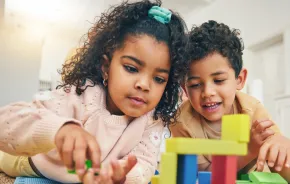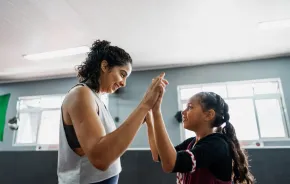
As a Gen X teen growing up in L.A., religion was the furthest thing from Fathia Absie’s mind. Since then, the Somali-American writer and filmmaker has lived and traveled all over the United States. “I don’t remember ever feeling uneasy or uncomfortable,” she says. But when she started to wear hijab, “everything changed,” she says. “How people treat me now is so different.”
For 21-year-old Seattle native Ahlaam Ibraahim, who grew up in a post-9/11 reality, religion has always been at the forefront of her identity, but she was insulated from prejudice by her environment. Her parents sent her to Islamic elementary school (which, like Catholic school, includes religious studies in addition to academic requirements). “For me, it was a really nice Muslim bubble.” Ibraahim says she was in middle school before she even found out about Muslim stereotypes.
Islam is the second largest religion in the world (Islam is the religion; Muslim is the adherent), with 1.8 billion followers constituting roughly a quarter of the world’s population. About one-third of the students in Tukwila schools identify as Muslim, but in 2014, the Pew Research Center reported that Muslims make up less than 1 percent of the total population of King County.
The result is that most of us in the Puget Sound have very little first-hand knowledge of Islam.
Muslim in Seattle
Ibraahim has a lot of practice answering Google-able questions about her religion. As a student at Rainier Beach High School, she even won an award for organizing community events to counter Islamophobia. Now a student at the University of Washington, she has started a marketing company, Third Kid Culture, to connect brands with Muslim consumers and improve media representation of Muslims.
Muslim youth just want to be youth. But we’re forced to become PR agents for our faith. Some days I’m tired of being the surprise factor in your day — I just want my sugar-free white chocolate mocha.
“My next-door neighbor is an Eritrean refugee, and we dress the same,” says Ibraahim. “People look at me and make a lot of assumptions about my gender, race and nationality. They assume I’m introverted and oppressed. But my dad raised me to speak up. People are surprised that I’m loud and a feminist.”
Dealing with microaggressions and answering strangers’ questions helped Ibraahim learn more about her own faith, but it takes an emotional toll. “Muslim youth just want to be youth. But we’re forced to become PR agents for our faith. Some days I’m tired of being the surprise factor in your day — I just want my sugar-free white chocolate mocha.”

Studies confirm that Muslim children are more likely to be bullied than children of other faiths. Last year, an internet rumor about murdering Muslims made the rounds at the SeaTac schools Absie’s daughters attend. Her terrified 6-year-old came home from school in tears. The incident led to a school assembly at her older daughter’s middle school, but she says her eighth-grader is still regularly subjected to name-calling and insults for wearing hijab.
“Not a day goes by without a story,” she says. “My daughter told me, ‘I make an extra point to be really nice to everyone in case anyone comes back [with a gun],’” says Absie.
Ibraahim agrees that fear of violence is a reality for Muslim youth. “I’m the oldest, and my siblings come to me [with their worries]. When Muslims were killed in New Zealand, no teachers spoke up at their school. My 10-year-old brother shouldn’t have to be thinking about these things,” she says.
Ramadan
This year, Muslims celebrate Ramadan from May 7 to June 5. The month-long holiday commemorates the revelation of the first verses of the Quran, Islam’s sacred text, and is marked by fasting during daylight hours. “It’s kind of like when Catholics give up something for Lent,” explains Ibraahim. During Ramadan, you are supposed to hold yourself to a higher spiritual standard. It’s not easy to behave better than normal when you’re hangry, but “You don’t want to get that speech from your parents!” laughs Ibraahim.
Iftar is the meal that breaks the fast each day of Ramadan and is often shared as a community. Ramadan ends with Eid al-Fitr, a day of feasting and celebration that usually includes praying at the mosque, visits with family, and presents for children. As with any religion, practices vary among communities, and even within families.
Ibraahim says she began fasting at the age of 7 despite her parents’ protests, but generally, children do not begin to fast until puberty. Her teenage siblings on the other hand, are more relaxed — one of them does not fast, and the other only fasts during some days of Ramadan.
Koloud “Kay” Tarapolsi, an art teacher and owner of A Crafty Arab, says, “That’s the beauty of Islam. The path is between you and Allah.” Tarapolsi has two daughters in high school and one in middle school in the Lake Washington School District. “We modify [the fast] because they are kids. Fasting is hard when you have finals and exams, and you don’t want them to have a bad experience with Islam. Ramadan is supposed to be difficult, but for adults. We try to find other ways to understand Islam.”
Good neighbors

Tarapolsi, who moved to the United States from Libya as a child, has not had the same experiences with prejudice that Ibraahim and Absie describe, perhaps in part because her family is less visibly Muslim. She and her daughters only wear hijab to pray, and their brown skin fits in with the large South Asian population in their Eastside neighborhood. But she believes that the diversity of her community also contributes to a culture of acceptance.
“Teachers are more conscious of Muslim students today. Kids can take off from school at Eid now. When they are fasting, my girls have the option to go into a classroom instead of the cafeteria at lunch. It’s neat to be in a space where we have neighbors who celebrate Diwali, who celebrate Hanukkah. I feel blessed being in a school system that is not discriminatory. I hear of schools that are not as tolerant and that makes me sad,” says Tarapolsi.
I think it’s simple, Our kids are watching and learning from us, so treat everyone with respect and dignity. Period.
The biggest challenge for her as a Muslim mother has been isolation from Arabic culture. “Here, there are so few of us that we miss the sense of belonging. We have to make the effort to show them the language and culture, to make [our children] understand they come from a greater community,” she says.
That’s why Tarapolsi established A Crafty Arab. “When I started looking for anything to connect my kids to their heritage, there was nothing. So, I started adjusting crafts to relate to the Arab world and Islam.” She established the Ramadan Challenge, 30 days of educational Ramadan-themed craft projects that Muslims and non-Muslims alike can complete. Now her website includes book reviews and teaching resources about Islam and the many Muslim cultures around the world; she teaches an Arab Culture Camp (July 15 this year) and runs the Our Little Voices Bookstore, a pop-up that sells only BAME-authored (Black, Asian, Minority Ethnic) books.
How to be an ally
Simple things, such as knowing the dates of holidays, can make a difference to your Muslim neighbors. Avoid scheduling lunch meetings or inviting Muslim friends to barbecues during Ramadan. A traditional greeting is “Ramadan Mubarak,” which means “Blessed Ramadan.” But if you are too shy to say it or can’t remember it, “Happy Ramadan is fine, too,” says Ibraahim.
Ibraahim notes that often when people ask questions about Islam, they do so in a way that reveals more bias than curiosity. “When you ask, don’t put neighbors in an uncomfortable situation,” Ibraahim warns. Some environments are more conducive to questions than others — a conversation over a meal is better than one that takes place in the line at Starbucks. During Ramadan, Tarapolsi suggests attending an iftar. “These are held all over town — ask a neighbor to bring you.”

Outside of Ramadan, dinner is still a great way to connect with Muslims in the community. Absie and her friend Ilays Aden launched Eat With Muslims, a program to bring Muslims and non-Muslims together over a shared meal, where guests can ask questions and get to know one another as people instead of as stereotypes.
“I think it’s simple,” says Absie. “Our kids are watching and learning from us, so treat everyone with respect and dignity. Period.”
Required ReadingWeb searches for books about Islam can dig up some terrifyingly biased results. Fathia Absie, founder of Eat With Muslims, recommends these books for adults who want to learn more about Islam.
No god but God: The Origins, Evolution, and Future of Islam by Reza Aslan The Qur'an by M.A.S. Abdel Haleem The Study Quran by Seyyed Hossein Nasr The Islamophobia Industry: How the Right Manufactures Hatred of Muslims by Nathan Lean. The Fragrance of Faith by Jamal Rahman What the Qur'an Meant: And Why It Matters by Garry Wills
Koloud “Kay” Tarapolsi recommends Night of the Moon: A Muslim Holiday Story and Golden Domes and Silver Lantern: A Muslim Book of Colors, both by Hena Khan, for kids. For more books, check out the many reviews and book lists — including 99 Ramadan children’s books — on Tarapolsi’s website, A Crafty Arab. |













